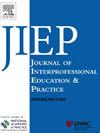Arts-based approaches in interprofessional education: A scoping review
Q3 Social Sciences
Journal of Interprofessional Education and Practice
Pub Date : 2025-05-22
DOI:10.1016/j.xjep.2025.100757
引用次数: 0
Abstract
Background
Arts-based education approaches utilize visual, literary, and performing arts to foster learning in non-artistic disciplines. In the health professions, arts-based education has been used to develop key knowledge, skills, and attitudes for health professional practice. Specifically, in interprofessional education (IPE) curricula, it has been used to develop competence in interprofessional collaborative practice.
Methods
A scoping review following the Preferred Reporting Items for Systematic Reviews and Meta-Analyses Scoping Review (PRISMA-ScR) guidelines was conducted to identify how arts-based education has been implemented in IPE curricula. A search strategy was implemented in four databases, and articles were reviewed by independent reviewers.
Results
Twenty-five articles met inclusion criteria. Drama/theatre, photography, and painting were the most common mediums used. Arts-based education was employed to develop students’ knowledge, skills, and attitudes in a range of domains; most commonly, interprofessional collaboration, communication skills, and understanding the experience of others.
Conclusion
Arts-based education appears to have distinct value in developing skills and attitudes that enhance relationship-building with clients and other practitioners. Further research is needed to determine the effectiveness of arts-based approaches in developing knowledge, skills, and attitudes necessary for interprofessional collaborative practice.
跨专业教育中以艺术为基础的方法:范围审查
基于艺术的教育方法利用视觉、文学和表演艺术来促进非艺术学科的学习。在卫生专业领域,以艺术为基础的教育被用来培养卫生专业实践的关键知识、技能和态度。具体而言,在跨专业教育(IPE)课程中,它已被用于培养跨专业合作实践的能力。方法根据系统评价和荟萃分析范围评价(PRISMA-ScR)指南的首选报告项目进行范围评价,以确定艺术教育在国际政治经济学课程中的实施情况。在四个数据库中实施搜索策略,并由独立审稿人对文章进行审查。结果25篇文章符合纳入标准。戏剧/戏剧、摄影和绘画是最常用的媒介。以艺术为基础的教育被用来发展学生在一系列领域的知识、技能和态度;最常见的是跨专业合作、沟通技巧和理解他人的经验。结论:以艺术为基础的教育在培养技能和态度方面具有独特的价值,可以增强与客户和其他从业人员的关系。需要进一步的研究来确定以艺术为基础的方法在培养跨专业合作实践所需的知识、技能和态度方面的有效性。
本文章由计算机程序翻译,如有差异,请以英文原文为准。
求助全文
约1分钟内获得全文
求助全文
来源期刊

Journal of Interprofessional Education and Practice
Social Sciences-Education
CiteScore
1.60
自引率
0.00%
发文量
80
期刊介绍:
Journal of Interprofessional Education & Practice, a quarterly online-only journal, provides innovative ideas for interprofessional educators and practitioners through peer-reviewed articles and reports. Each issue examines current issues and trends in interprofessional healthcare topics, offering progressive solutions to the challenges facing the profession. The Journal of Interprofessional Education & Practice (JIEP) is affiliated with University of Nebraska Medical Center and the official journal of National Academies of Practice (NAP) and supports its mission to serve the public and the health profession by advancing education, policy, practice & research.
 求助内容:
求助内容: 应助结果提醒方式:
应助结果提醒方式:


